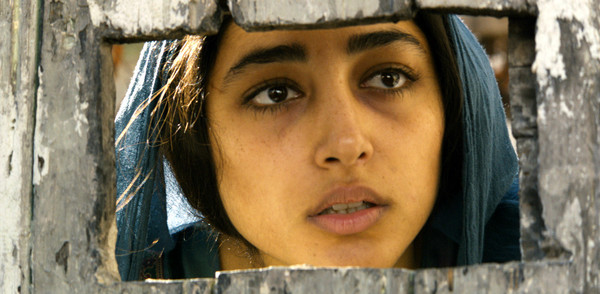The Patience Stone
The Persian story goes, when your heart is filled with sorrow, find a patience stone or syngué sabour that will listen as you talk to it until it can take no more and bursts into pieces, lifting that weight from your shoulders and leaving you free. This well-known legend has been written up any number of times, including by Iranian novelist Sadegh Chubak, and filmed at least once, in 1968. It is also the basis of the novel by Atiq Rahimi, Syngué sabour, that in 2008 won the Goncourt award, the most prestigious French literary prize. Rahimi, a French-Afghan writer and filmmaker now gives us the film version that he has co-scripted with famed French author Jean-Claude Carrière in an adaptation by Nahal Tadjadod. This version is set in Afghanistan under the Taliban.
The main character is portrayed by the stunningly beautiful and talented Iranian actress Golshifteh Farahani who carries the story from beginning to end. Farahani plays an Afghan woman. That is to say, she is nothing—her husband’s shadow after having been her father’s, a disposable entity who can only be grateful she is allowed to breathe. Her husband has recently become a paraplegic following an absurd honor-related dispute. The man, paralyzed from the neck down, lies all day on a mattress on the floor, unmoving, unseeing, unhearing. Looking after him becomes his wife’s main task and duty. She also needs to provide for him and her two little girls. There is no food, no water, no electricity and of course no money. The men in the family are away, perhaps fighting somewhere; No relatives are left except an aunt who had disappeared for a while and turns out to be working as a prostitute in the town’s brothel.
To say that life is harsh for the protagonist of this somber tale doesn’t begin to describe what she has to endure. Occasionally, she needs to step outside, wrapped in her burka, to find a safe place for her daughters, to get credit at the local pharmacy for her husband’s medication, to scuttle into the nearest basement, along with neighbors, in order to escape the constant explosions and gunfire, the Taliban riding roughshod in their armored jeeps, their machine guns on their knees, indulging at whim in the massacre of entire families. Her only solace is to sit by her inert husband, now her patient stone, and tell him about her days and also go over their life together, such as it was— she was married off at seventeen to this husband away at war at the time. The man has not kissed her once in ten years, not noticed her, not been curious about her, never even asked about the small scar by her eyebrow. Now she herself sells her body to a young soldier with whom she experiences pleasure.
The film is a masterpiece for its plain depiction of reality. Engaging at the simplest level, it doesn’t pull at heartstrings and delivers no message. There is nothing here but desperation and animal needs—people are thirsty, people are hungry and scared. “The Patient Stone” is carried throughout by the luminous Farahani who endows the character with resilience. An Afghan woman in her situation is only the lowliest creature, at the mercy of circumstances and of the males around her. She has known nothing but misery, she has banned from her vocabulary the word “hope,” if she ever heard it; life is nothing but an alignment of days she somehow survives. Yet when events take an unexpected course, Farahani’s features light up with something that resembles a smile.
news via inbox
Nulla turp dis cursus. Integer liberos euismod pretium faucibua


